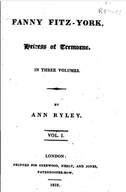| Clutching My Pearls is my ongoing blog series about my take on Jane Austen’s beliefs and ideas, as based on her novels. Click here for the first in the series. I’ve also been blogging about now-obscure female authors of the long 18th century. For more, click "Authoresses" on the menu at right. This is the second post about Ann Ryley (1760-1823) and her forgotten novel, Fanny Fitz-York (1818). |

In her preface, author Ann Ryley makes the pro forma disclaimer--very typical for the times--that she would rather be accused of lack of wit or invention, rather “than hear myself accused of shocking the nicest delicacy by a hint or an innuendo, that could raise a blush in the cheek of modesty.”
Yet, Ryley takes us to places Jane Austen never did—to a courtroom, to a bordello in London, to prison cells. Ryley shows poverty and destitution on the streets of London. And the curate’s sister Julia brings “everlasting disgrace” on her family by becoming a prostitute.
 Repentance
Repentance Julia Cavendish, whose older sister Rosette is a governess/companion to the heroine, runs off with a Wickham-like character. He soon abandons Julia in London and she becomes a prostitute, sinking much lower than Lydia in Pride & Prejudice. Also as with P&P, Julia's lapse seriously threatens the marital prospects of her sister Rosette. The curate fears “’tis more than probable a sister’s peace may be the sacrifice, for what mother would willingly yoke her son to a tainted stock?” Rosette's suitor is Sir Herbert the baronet, who starts out as a bit of a flighty man-about-town, but reforms when he falls in love with Rosette.
Julia is found—in fact she’s retrieved by Sir Herbert, just as Darcy helps to retrieve Lydia. (Sir Herbert doesn't have to lay down a lot of money to do it, but he takes Julia back to her brother.)
In Pride & Prejudice, Mr. Bennet rejects the advice of Mr. Collins to "forgive Lydia as a Christian" but forbid her from returning home, ("That is his notion of Christian forgiveness!").
In Fanny Fitz-York, Miss Simpkin, the spinster aunt who runs the curate's household, is quite unhappy that Julia has been given shelter there. She asks Fanny, the young heroine, to “ask your mamma to speak to his reverence. He will mind her more than any body else, and I dare say she might persuade him to turn her out.”
“Turn her out, madam!” said Fanny, in amazement. “Turn out his own sister!... That I am sure my mother will never do.”
Miss Strictland's answer makes you wonder just how poor Julia is managing living under the same room with this Mrs. Norris-like character: “Why, surely, Lady Ann cannot approve of his keeping her here, to the scandal of his cloth and the disgrace of his profession!”
Fanny replies: "The scandal and disgrace, madam, would be in turning her out. His profession teaches repentance and forgiveness of sins; but, by discarding her, he would shut out all prospect of the one, and by the same rule, all possibility of the other; and be, in fact, answerable for her misery here and hereafter.”
I should mention that Fanny Fitz-York's mother Lady Anne takes the same compassionate approach with both men and women who stray from the path of virtue. She rescues a highwayman who is captured by a mob and is in danger of being beaten to death. She gets him medical attention, listens to his story, and gets him back on his feet.
In other words, this is not just about female sexuality, it's about Christian beliefs around sin and redemption. The author also protests the strict criminal codes of the day.
Although Julia is reclaimed and repentant (and, surprisingly, she does not die of wasting heroine disease), her sister Rosette knows this is a dire scandal. Rosette insists that her lover Sir Herbert tell his mother the whole unhappy truth. Luckily, Sir Herbert's mother is broad-minded and Rosette and the baronet are wed.
By the way, I am mentioning these parallels to Austen not because I think Ann Ryley borrowed them from Pride & Prejudice. I think, rather, both novels touch on situations which frequently arose in real life and were widely used in novels.
However, Ann Ryley goes farther than Austen. She also goes out of her way to criticize what we might call conservative or evangelical elements in her society. Another minor character, Mary Leigh, is left destitute in London in winter. When she rushes up to a strange man in the street, deliriously thinking it is her husband, the man assumes she is a prostitute:
 The Sweet Delights of Love, Gillray
The Sweet Delights of Love, Gillray Ann Ryley also gives us a strong feminist statement from Lady Maria, Fanny's cousin, who writes to say she longs to be allowed to visit her aunt Lady Anne, but unlike her brother Lord Moseley, she can't just hop on a horse and go to Tremorne: “as I wear a petticoat—alias, a badge of slavery,—I must yield, though reluctantly, to imperious necessity." That one statement is more pointed that anything Austen ever wrote about the status of women.
Despite the restrictions on their lives, Ryley’s female characters act their parts with brio and self confidence. Even Miss Simpkin, the stereotypical spinster we met above, is very sure of herself and we're told the curate has to handle her with care.
Another minor character, Major Stokes, is totally dominated and henpecked by his wife: “and thus, passive obedience and non-resistance not only injured his peace at home, but ruined his character abroad.” Both he and his brother-in-law Mr. Gaskell eventually rebel against their wives and obtain legal separations. Clearly, Ryley has no issue with leaving a spouse you no longer love, as opposed to sticking it out 'til death do you part.
Another character, Lady Milford, drops a wicked reflection on her husband in front of their nephew George when Lord Milford tries to persuade him to enter politics:
| "Lady Milford entered the room, and hoped her lord was not going to spoil a rational creature by transforming him into a politician. “'Are rationality and politics at variance?' enquired her nephew. “'Entirely, my dear George, rationality, and sociability, and politeness, and all the common courtesies of domestic life are sacrificed—and for what? jealousy, heart burnings, envy, and a thousand other bad passions, which I sure are a great torment to their possessor. I was bewitched after what I saw at home to marry a statesman, who is good for no earthly thing out of the counsel-chamber, whatever he may be in it.'” |
In addition to the strong opinions expressed by her female characters, Ryley also drops in her own editorials, such as this one in Volume III: “A gentleman of spirit may ruin his tailor, his shoemaker, his hosier, with impunity, and not, thereby, lessen his credit with his associates, but let him contract a gambling debt, and be either unwilling or unable to pay it, he is posted for a poltroon, and rendered incapable of mixing with honourable men. There is something vitally wrong in this…”
 An Old Maid, Rowlandson
An Old Maid, Rowlandson Although Ann Ryley is what we might call liberal or progressive in her views, she is still very conventional in her emphasis on female chastity. Ryley made a point of protesting that she stayed away from anything remotely ribald in Fanny Fitz York. The market called for chaste heroines, and the critics gave a thumbs down to novels which had no "moral tendency." Ann Ryley complied with this expectation. Julia's downfall is just that—a falling off from the expected high standard of virtue.
Back then, it was all about the morality. Authors very often declared themselves to be on the side of morality. As I mentioned above, Ryley protested she didn't want to “raise a blush in the cheek of modesty.”
And she finished her novel with: “I declare, honestly and candidly, that to instil virtue and morality has been my aim, however I may have erred in the means."
You don't put disclaimers like that in your preface and your conclusion unless you are responding to strong social sanctions. In those days, authors and publishers had to reassure everyone that they weren't contributing to moral degeneracy. It's like a company posting their diversity statement or movie credits assuring everyone that no animals were injured or harmed. Novels were in themselves controversial and a disclaimer like Ann Ryley's was a way of saying the novel could be safely read by young ladies.
| Why did prisoners beat hemp? It was the first tedious step in making rope, as you can see in this video. Physical toil at repetitive tasks like cutting and threshing wheat, chopping firewood, shoveling manure, carding wool, etc., was the lot of the majority of people in the pre-industrial age. The Society for the Suppression of Vice also makes an appearance in my novel, A Different Kind of Woman. The president of the Bristol chapter raises a ruckus when he discovers that French prisoners of war have been making and selling naughty carvings and pictures. | |


 RSS Feed
RSS Feed